What is the CIT?
The CIT is forged by a deep partnership between faith and reason, as if two sides of the same coin. It reflects the conviction that rational people need to understand their faith for it to be credible. Likewise, in-depth reasoning leads to questions of ultimacy that encourage a faith response. However, for any of us in the everyday of life, this faith/reason partnership of CIT coalesces most intensely around momentous questions about ourselves like “Where do we come from?”; “Who or what are we?”; and “Where are we going?” Responding to such ultimate issues calls for faith and reason working together, and at times, perhaps in fruitful tension.
Sacramental Principle
Perhaps the most defining feature of a Catholic outlook on life in the world is the sacramental principle. While it can be described in many ways, it comes down to an attitude that sees the more in the midst of the ordinary, the ultimate in the created order. There is always “more than meets the eye” and it is God’s presence and effective love at work—what we mean by “grace.” This sacramental principle shapes the Catholic intellectual tradition by encouraging peoples’ in-depth look at everything, with a rigorous examination of reality. The more we can “see through what is there” the more we recognize that all creation reflects and is held in existence by God’s love.
Faith and Reason
Reason alone is likely to concentrate on knowing what is and not as likely to ask why it is. On the other hand, faith alone can tend to focus on why things are but neglect the data of what is and the demands of faith. It is when faith unites with reason and when reason works with faith that people are most likely to look intensely at the realities of life, and to ask ultimate questions about those realities. This is precisely why the CIT can encourage dialogue among and across the various disciplines of learning within academia, with all working together to empower the search for wholeness.
Focusing the Theme
Central to the CIT is the conviction that God communicates with us in a multiplicity of ways. In other words, God's word comes to us not just through biblical revelation but through the very structure of reality and God's whole created order (see Romans I:19-20). We hear this conviction reflected in the opening lines of John's Gospel, where the term logos refers to the revealed "word" of God and connotes human "reason" as well. It is the combination of the truths found in God's word and through human reason that enables Catholic faith to make compelling arguments around social issues like the value of work, and that justice demands a living wage for all workers.
Transforming Lives
A distinctive aspect of the CIT is to engage students with great ideas (usually by exposure to great thinkers such as Plato, Aristotle, Augustine, and so on). It does so not simply to learn about them but to learn from them for life. This is how the union of faith and reason becomes integrated in the CIT to the advantage of students. It invites them to take great ideas to heart, to make them their own, and to do so from a faith perspective— faith in themselves, in others, in life, and, grounding all, in God. Because the CIT reflects the conviction that all intellectual work quests for truth, which is ever grounded in ultimate Truth, can help people to connect great ideas from across the disciplines of learning and, even more importantly, with their own lives.
Law of Social Justice
One common stereotype of the word “intellectual” raises the image of a lone scholar who is more concerned about ideas than real issues. By contrast, in the CIT, faith and reason combine into what is, in fact, a spiritual way of knowing. This can make a world of difference to Catholic higher education, for example, making its law school education more likely to promote justice for all.
Informing Caregivers
The CIT can empower our striving for wholeness. However, its union of faith and reason is never more needed than when we face the precariousness of life, as in facing serious illness or the reality of death. As a Catholic college or university prepares people for the helping professions such as nursing, it can lend a unique resource to encourage care and compassion for the human condition when most in need.
Open to All Truth
St. Augustine said some 1,500 years ago that “catholic” means to be open to the truth, wherever it can be found. Yet, for many centuries the Church itself was not open to learn from nonChristian religions—this would not happen until the Second Vatican Council. Throughout the centuries, however, the Catholic Church has consistently taught that all people of goodwill who, through no fault of their own, do not have access to Christian faith, yet can be saved by “baptism of desire.” Vatican II and its “Declaration on Non Christian Religions” (Nostra Aetate) went a significant step further; it encouraged respect for and dialogue with nonChristian religions precisely because they have “a ray of that truth which enlightens all people.”
Catholic Higher Education
The CIT epitomizes the ancient Catholic conviction—reaching back to the beginnings of the Church—that faith and reason, divine revelation and human scholarship, are necessary partners to each other. The pages of history are replete with examples of the danger of “faith” that does not have the tempering influence of “reason.” Likewise, reasoning without the guidance of faith and of a Source of Truth higher than ourselves can be equally dangerous. Yet, holding the two—faith and reason—in mutuality, sometimes in fruitful tension rather than choosing either/or, can be a challenge. In many ways, the modern university is marked precisely by its collapse of the tension and its favor for reason alone. It is not easy for Catholic higher education to resist the temptation to do likewise.
Articles

Gregory Kalscheur
Dean, Morrissey College of Arts & Sciences

.png)

